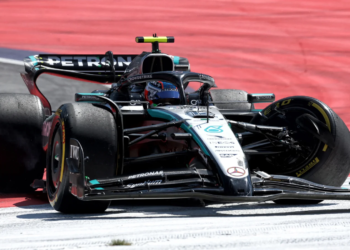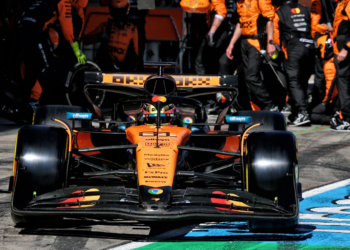Adrian Sutil: The Nurburgring is a great place to go racing. It’s my home grand prix and the atmosphere is always very special there. Plus, there’s a lot of history associated with the place. When I go back there it reminds me of my early racing days when I was just starting out in cars and driving in Formula BMW and F3. I’ve spent a lot of time there and I know the circuit very well. Since I’ve been in F1, I’ve raced there twice. The track is challenging because there is such a variety of corners: high, medium and low speed, so you really need a car that is well balanced for every kind of corner, which isn’t easy. The first sector is technical, while the second sector has a good flow to it, and the final part has the big straight. It’s a smooth circuit with not too many bumps, but you have to be careful with the kerbs at the NGK chicane because they are really high and you can’t really use them. That means we can run a stiffer set-up with the car.
Paul di Resta: Although I’ve been to the Nurburgring a few times, I’ve never raced on the full grand prix track. It was always the shortened version used for the DTM races. So I only know parts of the track. During my visits there I’ve learned that the weather can be quite unpredictable. It’s usually quite cold and it rains a lot. So that could be a major factor for the weekend, just as it was in Silverstone. I think we should be quite positive going into the race. After strong qualifying performances at Valencia and Silverstone, we’ll be working hard to try and get a race result that reflects our pace. I know the German fans will be out in force with six German drivers to support. But they will have to work hard to match the atmosphere we had at Silverstone, which was very special.
Vijay Mallya, team principal: The German Grand Prix marks the midpoint of the season and is a good chance to stand back and assess our performance over the first nine races. What is clear is that we have an excellent driver line-up and a car that is improving race by race, which gives us cause to be optimistic about the second half of the year. However, we know there is a big task ahead if we are to catch our closest competitors, Toro Rosso and Sauber. Looking back on Silverstone, we have to view it as a missed opportunity. With confusion on the pitwall, we failed to convert our excellent qualifying performance into points, which is incredibly frustrating. These things happen in racing, but we have put measures in place to ensure such a situation cannot happen again. Although Silverstone became a race of unrealised potential, we can take a lot of positives from our performance. Over the last few races we have demonstrated that the competitiveness of the car continues to improve and we are capable of qualifying consistently in the top 10. What is important now is to deliver that performance in the races where it matters most of all.

![Lando Norris and Oscar Piastri [McLaren] celebrate their 1-2 finish at the 2025 F1 Austrian GP](https://www.motorsportweek.com/wp-content/uploads/2025/06/Lando-Norris-Oscar-Piastri-McLaren-F1-2025-1-120x86.webp)

![Lando Norris and Oscar Piastri [McLaren] celebrate their 1-2 finish at the 2025 F1 Austrian GP](https://www.motorsportweek.com/wp-content/uploads/2025/06/Lando-Norris-Oscar-Piastri-McLaren-F1-2025-1-350x250.webp)


